1990 Cadillac Allante convertible 112K miles fantastic condition
- Price:
- Condition: Used
- Make: Cadillac
- Model: Allante
- Type: Convertible
- Year: 1990
- Mileage: 112,000
- VIN: 1G6VS3388LU126304
- Color: Red
- Engine size: 4.1L V8
- Number of cylinders: 8
- Power options: Air Conditioning, Cruise Control, Power Locks, Power Windows, Power Seats
- Fuel: Gasoline
- Transmission: Automatic
- Drive type: FWD
- Interior color: Black
- Safety options: Anti-Lock Brakes, Driver Airbag
- Options: Cassette Player, CD Player, Convertible, Leather Seats
- Vehicle Title: Clear
- Location: Merritt Island, Florida, United States
Description
Sorry, thought I was limited to 12 pics. I will add more in a day or two.Car is located in Merritt Island, Florida.
Beautiful 1990 Cadillac Allante. Wife says it MUST GO.
Clear title.
100% original.
Outstanding Euro Red paint and charcoal gray leather interior.
No leaks.
Tires are good but probably need balancing.
Rust free Florida car
Top is like new. Has the front top pull down motors which was an addition to the 1990 models mid-year. Very convenient.
No brake issues at all.
Mechanically strong....engine and transmission are working fine. This car runs great and when you punch it, it really takes off. Lots of fun to drive. No alarms, check engine lights, or anything that makes me nervous when I take it out on the road.
I hardly ever drive it with the top up. Runs smooth at 10 or 75 MPH......really is a lot of fun to drive and is a head-turner.
Air Conditioning and heat are fine.
Strong battery, starts in 3 seconds every time.
All glass is perfect.
Comes with owners manual and shop manual.
NOW THE BAD STUFF:1. Rare Cassette AND Cd player combination seen only on late 1990 models. BOSE sound system is not working. Troubleshooting shows the control module is bad. That should take about 1 hour and four screws to replace. Parts are available for about $230. Instructions on YouTube. If it does not sell before I fix it then the price will go WAY up. In my opinion this is the only major problem with the car.
2. Convertible pull-down motor needs to be adjusted. Works fine but when the motor pulls down the top it pulls too far and the top latch snaps out of the pull-down hook.
******************************
Sorry but I don't text. Please contact me by email through ebay messaging or at 321-305-6539 and ask for Andy
Best to call between 9AM and 6 PM EST. Able to meet you to check out this car pretty much any time, any day.
PAYMENT: $500 due within 48 hours of auction closing. Balance due on pickup.
Delivery: I would consider delivering this car anywhere in the country becauseit is so much fun to drive. I doubt anyone would want to pay for the gas, hotel, and airfare though. I will work with any shipping service you set up.
You make the arrangements and I will be sure to be there with the car and all necessary paperwork.
Overview[edit]
Originally designed to compete with theMercedes-Benz SLandJaguar XJS, the Allanté featured a slightly modified variant of the 4.1literV8used across Cadillac's model line.
The Allanté is noted for an unusual production arrangement, where completed bodies — designed and manufactured in Italy byPininfarina—[1]were shipped 4,600mi (7,400km) fromItalyin specially equippedBoeing 747s, 56 at a time,[1]to Cadillac'sDetroit/Hamtramck Assemblyplant where they were mated with domestically manufactured chassis and engine assemblies.[1]Bodies had to be flown from theTurin International Airportin Italy to Detroit'sColeman A. Young International Airport, about 3 miles northeast of the new Hamtramck factory, known as the "Allante Air Bridge".[2][3]The expensive shipping process was implemented because GM had recently closed theFisher Body Plant #18which traditionally supplied Cadillac bodies since 1921. This was not the first time that Cadillac turned to Pininfarina for body work, they previously farmed out body production to the Turin-based coachbuilder for the1959 Eldorado Brougham, as well as that forseveral one-offs, customs, and concept cars.
1990[edit]
In 1990, Cadillac offered a lower-priced ($53,050) companion model with a cloth convertible roof and without the removable aluminum hardtop, and a model including the hardtop at $58,638. By midyear, prices were dropped to $57,813 for the hardtop/convertible and $51,500 for the convertible, which included a $650Gas Guzzler Taxalong with $550 destination charge. The fully integrated cellular telephone, which was equipped from the factory on just 36 cars this year, was available for an additional $1,195. Allanté's bumper-to-bumper new car warranty, seven years and 100,000mi (160,000km), was three years longer than other Cadillacs, and an additional 50,000mi (80,000km) of coverage. Allanté owners also received a special toll-free number to call for service or concerns. Headlamp washers and dual 10-wayRecaroseating remained standard, among other niceties. A driver's side airbag was added to the leather-wrapped steering wheel, eliminating the telescoping steering wheel — which retained its tilt feature. The analog instrument cluster – introduced the previous year – was standard on the convertible (available at no extra cost on the hardtop/convertible), however, only 358 cars were equipped with the analog cluster. The power mirror control moved from the right of the steering column on the instrument panel to a new location on the upper end of the driver's door armrest, while the power seat switches (previously mounted on the face of the seat base) were relocated to the lower side trim of the seat base facing the door panels. The 3-channel garage door opener base mounted on the header panel above the windshield was eliminated when a revamped sun visor design was introduced this year. Technological news was the addition of traction control – the first front-wheel drive automobile with a V8 in the world to be equipped as such. The elaborate system was able to cut fuel to up to four cylinders to reduce power and optimize traction. Theelectronically controlled shock absorberswere retuned to remain in "soft" mode for up to 40mph (64km/h). Previously, they entered "normal" mode after just 25mph (40km/h). A revised audio system allowed a CD player to be added as standard equipment, along with the cassette player. Of the 2,523 built for 1990, only five were exported – four toCanadaand one to Germany. Allanté was available in eight colors this year, the most popular wasEuro Red, found on 1,012 cars, while the least chosen wasGray Metallic, with only 28 made. Interior color choices (and production figures) wereCharcoal Gray(1,343),Natural Beige(767), andMaroon(413).
 1990 Cadillac Allante Convertible .......26,000 ORIGINAL Miles.
1990 Cadillac Allante Convertible .......26,000 ORIGINAL Miles.
Mileage: 26,393
 1990 Cadillac Allante / Roadster Convertible / Red / LOW MILES - PERFECT
1990 Cadillac Allante / Roadster Convertible / Red / LOW MILES - PERFECT
Mileage: 62,708
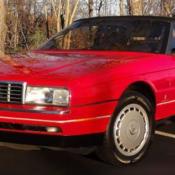 1990 Cadillac Allante Convertible Red Low Miles Beautiful RARE L@@K NR!!!!
1990 Cadillac Allante Convertible Red Low Miles Beautiful RARE L@@K NR!!!!
Mileage: 51,696
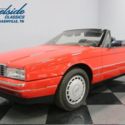 1990 Cadillac Allante 167008 Miles Red Convertible 4.5 Liter V8 4 Speed Automat
1990 Cadillac Allante 167008 Miles Red Convertible 4.5 Liter V8 4 Speed Automat
Mileage: 167,008
 1990 Cadillac Allante 63550 Miles White Convertible 4.5 Liter V8 Automatic
1990 Cadillac Allante 63550 Miles White Convertible 4.5 Liter V8 Automatic
Mileage: 63,550
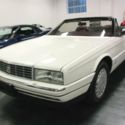 1990 Cadillac Allante Pearl White Red Leather Low Miles Beautiful Convertible
1990 Cadillac Allante Pearl White Red Leather Low Miles Beautiful Convertible
Mileage: 89803
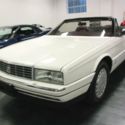 1990 Cadillac Allante Pearl White Red Leather Low Miles Stunning Convertible
1990 Cadillac Allante Pearl White Red Leather Low Miles Stunning Convertible
Mileage: 89803
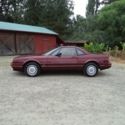 1988 Cadillac Allante Convertible w/hard top.91k.miles very clean nice condition
1988 Cadillac Allante Convertible w/hard top.91k.miles very clean nice condition
Mileage: 91,391
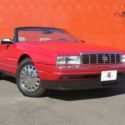 1993 Cadillac Allante Convertible, 4.6L Northstar V8, 9900 Miles, LAST ALLANTE!
1993 Cadillac Allante Convertible, 4.6L Northstar V8, 9900 Miles, LAST ALLANTE!
Mileage: 9,960
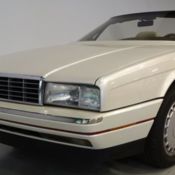 1990 Cadillac Allante Convertible
1990 Cadillac Allante Convertible
Mileage: 70,000












